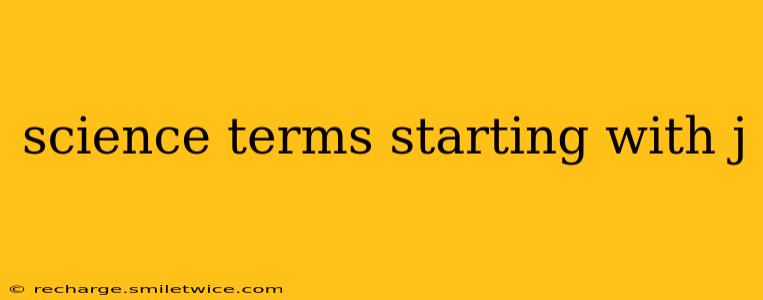The world of science is vast and complex, encompassing numerous disciplines and specialized terminology. This guide delves into a selection of science terms starting with the letter "J," providing definitions, explanations, and relevant contexts to enhance your understanding. We'll explore terms across various scientific fields, aiming to provide a comprehensive overview for both students and enthusiasts.
What are some common science terms that start with the letter J?
This is a broad question, as the letter J isn't as heavily represented in scientific terminology as some other letters. However, several important terms begin with "J," spanning various scientific disciplines. We'll explore some of the most relevant and commonly encountered ones.
J-Coupling (Nuclear Magnetic Resonance)
J-coupling, or scalar coupling, is a phenomenon observed in nuclear magnetic resonance (NMR) spectroscopy. It refers to the indirect interaction between two magnetic nuclei through the bonding electrons. This interaction causes splitting of the NMR signals, providing valuable information about the connectivity and stereochemistry of molecules. The magnitude of the J-coupling constant (measured in Hertz) is highly dependent on the number of bonds separating the nuclei and their relative stereochemistry. This information is crucial for structural elucidation in organic chemistry and other fields.
Joule (Unit of Energy)
The joule (J) is the standard unit of energy in the International System of Units (SI). Named after James Prescott Joule, it represents the work done when a force of one newton is applied over a distance of one meter. The joule is used extensively across physics, chemistry, and engineering to quantify energy in various forms, including kinetic energy, potential energy, heat, and work. For example, a calorie (a unit of energy often used in nutrition) is equivalent to approximately 4.184 joules.
Jacobian Matrix (Mathematics)
In mathematics, particularly in vector calculus and linear algebra, the Jacobian matrix represents the first-order linear approximation of a differentiable function. It's a matrix of all first-order partial derivatives of a vector-valued function. The determinant of the Jacobian matrix, known as the Jacobian determinant, is crucial in various applications, including change of variables in multiple integrals and analyzing the behavior of dynamical systems. Its use extends into fields like robotics, computer graphics, and fluid dynamics.
Jet Stream (Meteorology)
A jet stream is a fast-flowing, narrow air current found in the atmospheres of some planets, including Earth. These powerful winds typically flow from west to east, at altitudes ranging from 7 to 12 kilometers. Jet streams play a crucial role in shaping weather patterns, influencing the movement of storms and air masses. Understanding jet streams is vital for accurate weather forecasting. Their variability and position can significantly impact local and regional climates.
Juvenile (Geology)
In geology, juvenile refers to volcanic rock material derived directly from the Earth's mantle. This material has not previously been part of the Earth's crust. It's contrasted with recycled crustal material that is melted and re-erupted. The study of juvenile material provides insights into the composition of the Earth's interior and the processes involved in magma generation.
What other scientific terms begin with J?
While less common than terms in other alphabetical ranges, other scientific terms beginning with "J" exist within highly specialized fields. Further research into specific scientific disciplines will uncover more niche terms. The key to finding them is focusing your search on the specific area of science you are interested in (e.g., "j-terms in astrophysics").
This guide provides a foundation for understanding some key science terms beginning with "J." By exploring the context and applications of each term, you can build a stronger grasp of scientific concepts and their interconnections.
